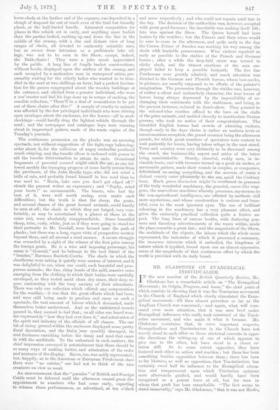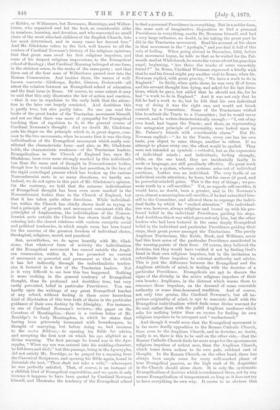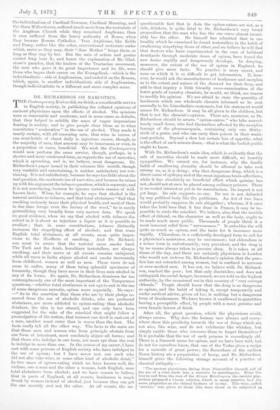MR. GLADSTONE ON EVANGELICAL INDIVIDUALISM.
IN the new number of the British, Quarterly Review, Mr.
Gladstone has a remarkable article on "The Evangelical Movement ; its Origin, Progress, and Issue," the chief point of. which consists in showing that it was the Tractarian movement in the Church of England which chiefly stimulated the Evan- gelical movement,—till then almost powerless so far as the Anglican Church was concerned ;—and again, what will com- mand even more attention, that it was men bred under Evangelical influences who really took command of the Tract- arian movement, and who made it what it became. Mr. Gladstone maintains that, in some important respects, Evangelicalism and Tractarianism in the Church have not merely stood to each other as those electrical currents in oppo- site directions the setting-up of one of which appears to give rise to the other, but have stood in a closer re- lation still. As to some extent opposites, they have fostered each other as action and reaction ; but there has been something besides opposition between them ; there has been so far likeness, as well as opposition, that Tractarianism has certainly owed half its influence to the Evangelical educa- tion and temperament upon which Tractarian opinions were afterwards grafted, and would hardly have been recognised as a potent force at all, but for men in whom that graft has been remarkable. " The fact seems to stand immovably," says Mr. Gladstone, " that it was. not Hooks,
or Kebles, or Williamses, but Newmans, Mannings, and Wilber- forces, who organised and led the host, so considerable alike in numbers, learning, and devotion, and who converted no small share of the most attached children of the English Church, into her most determined, and in many cases her fiercest foes." And Mr. Gladstone refers to the fact, well known to all the readers of Cardinal Newman's history of his religious opinions, that that great man owed his first religious impulses, and some of his deepest religious impressions, to the Evangelical school of theology ; that Cardinal Manning belonged at one time, in the strictest sense, to the ranks of the same party ; and that three out of the four sons of Wilberforce passed over into the Roman Communion. And besides those, the names of well- known converts—Sibthorpe, Ryder, Simeon, Dodsworth—all attest the relation between an Evangelical school of education and the final issue in Rome. Of course, to some extent it may be said that this only illustrates the law of action and reaction, —that it was in repulsion to the early faith that the attrac- tion to the later one largely consisted. And doubtless this is partly true, but also partly false. No one can read the books of the great leader of the Tractarian movement himself, and not see that there was more of sympathy for Evangelical teaching than of repulsion to it, in the general course of Cardinal Newman's thought. And no doubt Mr. Gladstone puts his finger on the principle which is, in great degree, com- mon to the two movements, when he asserts that it was the deep individualism of the Evangelical movement which really con- stituted the characteristic force—and also, as Mr. Gladstone holds, the characteristic weakness—of the Tractarian leaders. Evangelicalism in the Church of England has, says Mr. Gladstone, been even more strongly marked by this individual- ism than the same cast of thought in Nonconformist bodies, though how he would maintain this last assertion, in the face of the rapid centrifugal process which has broken up the various Nonconformist sects in so many directions, we hardly see. Indeed, we do not agree in this part of Mr. Gladstone's opinion. On the contrary, we hold that the extreme individualism of Evangelical thought has been even more marked in the Nonconformist bodies than in the Church of England, but that it has taken quite other directions. While -individual- ism within the Church has chiefly shown itself in trying to find a principle of growth and movement consistent with the principles of Anglicanism, the individualism of the Noncon- formist sects outside the Church has shown itself chiefly by entering into the closest relations with various energetic social and political tendencies, in which ample room has been found for the exercise of the greatest freedom of individual choice, theological, religious, moral, and practical.
But, nevertheless, we do agree heartily with Mr. Glad- stone, that whatever form of activity the individualism of the Evangelical movement has caused outside the Angli- can communion, within it, it has promoted no current of movement so powerful and permanent as that to which it has led indirectly through the individualistic tenden- cies it fostered in a few of the Tractarian leaders. Nor is it very difficult to see how this has happened. Nothing is more striking in the general tendency of Evangelical thought, than its profound and doubtless true, but very easily perverted, belief in particular Providence. You can hardly open the writings of any great Evangelical teacher of any school, without finding in them some hazardous kind of illustration of this true faith of theirs in the particular guidance of their own destiny by the Almighty. For instance, in one of Cardinal Newman's reviews,—the paper on the Countess of Huntingdon, there is a curious letter of Mr.
Berridge's to Lady Huntingdon, in which he states that having been grievously tormented with housekeepers, he thought of marrying, but before doing so, had recourse to the series Biblicae,—to opening his Bible for advice, and accepting the first text on which his eye alighted as a divine warning. The first passage he found was in the Apo- crypha, " When my son was entered into his wedding-chamber, he fell clown and died;" but this passage, being in the Apocrypha, did not satisfy Mr. Berridge, so he prayed for a warning from the Canonical Scriptures, and opening his Bible again, found in Jeremiah the text, "Thou shalt not take a wife,"—whereupon he was perfectly satisfied. That, of course, is an instance of a childish kind of Evangelical superstition, and we quote it only because it happens to have been quoted by Cardinal Newman himself, and illustrates the tendency of the Evangelical school to find a personal Providence in everything. But in a nobler form, the same sort of imaginative disposition to find a personal Providence in everything, marks Dr. Newman himself, and had a very large influence, no doubt, in his taking the great part he did in the Tractarian movement. Read his account of his share in that movement in the " Apologia," and you find it full of this vein of feeling. When going abroad in December, 1832, before that movement began, he tells us that as he waited for the Fal- mouth mail at Whitchurch,he wrote the verses about his guardian angel, beginning, "Are these the• tracks of some unearthly friend P" In Rome, Cardinal Wiseman expressed a kindly wish that he and his friend might pay another visit to Rome, when Dr. Newman replied, with great gravity, " We have a work to do in England." In Sicily, when quite alone, he was very ill of fever, and his servant thought him dying, and asked for his last direc- tions, which he gave, but added that ho should not die, for he had " a work to do in England." And it was not only that he felt he had a work to do, but he felt that his own individual way of doing it was the right one, and would not brook control by a Committee. Some of the Tractarians wished him to submit the Tracts to a Committee ; but he would never consent, and he writes characteristically enough :—" I, out of my own head, had begun the Tracts ; and these, as representing the antagonist principle of personality, were looked upon by Mr. Palmer's friends with considerable alarm." But Dr. Newman replied:—" As to the Tracts, every one has his own taste, you object to some things, another to others. If we attempt to please every one, the effect would be spoiled. They were not intended as symbols a cathedA, but as the expression of individual minds ; and individuals, feeling strongly, while, on the one hand, they are incidentally faulty in mode or language, are still peculiarly effective. No great work was done by a system, whereas systems arise out of individual exertions. Luther was an individual. The very faults of an individual excite attention ; he loses, but his cause (if good, and he powerful-minded) gains. This is the way of things ; we pro- mote truth by a self-sacrifice." Yet, as regards self-sacrifice, it would have, no doubt, been a greater, and in Dr. Newman's eyes, almost a meaningless self-sacrifice, if he had submitted him- self to the Committee, and allowed them to expunge the indivi- dual faults by which he "excited attention." His individual. ism was, however, always religious and bound up with his pro- found belief in the individual Providence guiding his steps. And doubtless this it was which gave not only him, but the other leaders who had been fostered in the same deeply Evangelical belief in the individual and particular Providence guiding their steps, their great power amongst the Tractarians. The purely Anglican Tractarians, like Keble, Hook, and Williams, never had this keen sense of the particular Providence manifested in the turning-points of their lives. Of course, they believed the doctrine, but they would have verified it not by finding God's hand in their own religious impulses, but in the invitation to subordinate those impulses to external authority and advice. This is just the difference between the Evangelical and the Anglican attitude of mind, in dealing with the doctrine of a particular Providence. Evangelicals are apt to discern the signs of the divinity in the active religious impulses of their own hearts ; Anglicans, in the distrust which warns them to renounce those impulses, on the demand of some venerable authority or some time-honoured tradition. And of course, not only true genius, like Cardinal Newman's, but all im- perious originality of mind, is apt to associate itself with the Evangelical individualism which finds some divine warrant for its zeal, rather than with the pallid Anglican meekness which asks for nothing better than an excuse for finding its own religious impulses to be arrogant and " unchastened."
And though it would seem that the Evangelical movement is in far more deadly opposition to the Roman Catholic Church, than even to the Anglican Church, and in doctrine, no doubt, really is so, there is this to be said on the other side,—that the Roman Catholic Church finds far more scope for the spontaneous religious impulses of ardent men, than the Anglican Church, which tones down ardour to its own pale, subdued cast of thought. In the Roman Church, on the other hand, there has always been ample room for every well-marked phaseof true Evangelical passion, as the high rank of St. Augustine in the Church should alone show. It is only the systematic Evangelicalism of doctrine which is condemned there, not by any means Evangelicalism of temperament, so long as it does not try to have everything its own way. It seems to us obvious that
the individualism of Cardinal Newman, Cardinal Manning, and the three Wilberforces, suffered much more from the restraints of the Anglican Church while they remained Anglicans, than it ever suffered from the heavy authority of Rome, when they became Roman Catholics. True Anglicans, like Keble and Pusey, rather like the sober, conventional restraints under which, move as they may, their "dear Mother" keeps them, so long as they stay by her. But the men. of action and genius cannot long bear it; and hence the explanation of Mr. Glad- stone's paradox, that the leaders of the Tractarian movement, the men who gave it its great importance and its life, were those who began their career on the Evangelical,—which is the individualistic—side of Anglicanism, and ended it on the Roman, which, again, is another individualistic side of Anglicanism, though individualistic in a different and more complex sense.




































 Previous page
Previous page